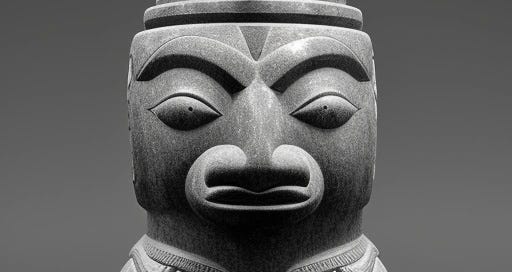There are several definitions for what constitutes a “civilization.”
One is more aesthetic, terms like “refined,” “polite,” “cultured,” “sophisticated,” “modern,” and “orderly.” Sometimes, it is defined as being “well-governed” or “well-educated.”
This is not what I wish to discuss today, as pretty much everyone thinks their group is “civilized” and those whom they do not like are “uncivilized.” Indeed, you can scarcely declare a people “not civilized” without it being interpreted it as a slur or insult.
Nor am I talking about culture, which is something different. Cultures are about shared values.
By “civilization,” I mean it in the most literal sense of the word, as in a people who live in one place (sedentary). It might be a village or a town or a (proper) city, but they have a fixed abode. In other words, they are not nomad hunter-gatherers or pastoralists.
So, which is/was the longest-lasting civilization in human history?
Distorted Mirror
It isn’t the aborigines of Australia because yes, their culture is something like 13,000 years old, but they were never people of a fixed abode until they were overrun by representatives of British civilization.
Not that most people would answer “Australian aborigines” to the question.
Over the years, I’ve asked dozens of people and gotten a lot of different answers to my question. In most recent times, I’ve asked Google, and this morning, I asked ChatGPT.
Generally, the responses are either Ancient Egypt (of the pharaohs), the Roman Empire, or else China.
ChatGPT chose Ancient Egypt, although to its credit, it did say that the topic is a “matter of debate.”
By most accounts, Ancient Egyptian civilization (living in fixed settlements) began around 3100 BCE and lasted until the conquest of Egypt by Alexander the Great in 332 BCE, making it approximately 3,000 years old.
If you want to stretch it and say that Egypt of today is the “same” civilization, then you get a total of approximately 5,000 years.
Ancient Rome, if you combine the period of kings (800 BCE) plus the Republic of Rome plus the Roman Empire (Caesars) all the way to relocation to Constantinople until its overthrow by Ottoman forces (1453 CE) gives you roughly 2,300 years.
China, if you count the Xia Dynasty (2100 BCE) as its founding and ignore all the various times it was overrun and ruled by foreigners, stipulating that modern China is a continuation of the “same” civilization, has lasted approximately 4,000 years.
All of those figures are certainly impressive, but they pale in comparison to the longest-lasting of them all.
Dogu Says Hi
The civilization that surpasses them all is the Jomon civilization in what is now Japan, which lasted approximately 14,000 years.
Unfortunately, we don’t really know what the Jomon people called themselves as the name was invented by an American "orientalist” who styled himself as the “father of Japanese archeology.”
The Jomon were certainly a civilization in every sense of the word. They lived in villages/towns year-round. They had a system of governance and law and order. Archeology has shown that their towns were well planned out, with distinct locations for worship and for disposing of refuse.
The Jomon were a people of outstanding skill and craftsmanship, creating everything from sophisticated tools to jewelry. They had exquisite pottery and crafted wonderful figurines and erected huge multi-story buildings.
Some of the sculptures that archeologists have unearthed are breathtakingly beautiful and some are quite haunting.
Furthermore, the Jomon were not pastoralists. They did not wander from place to place in search of food. They did little farming, but were skilled horticulturalists, meaning they pruned and shaped and tended trees, particularly nut-bearing ones that provided a big portion of their diet.
The rest of their diet came from the abundance of the sea. Even today, the waters off of modern Japan are renowned for their abundance thanks to ocean currents that bring in vast quantities of nutrients for fish and other marine life.
Whether by aesthetic considerations or by the literal definition of a people of fixed abode, the Jomon were definitely a civilization.
Wipeout
So, why have you (probably) never heard of the Jomon? And is my spellchecker going nuts every time I write the word?
Well, for a couple of reasons. First, the collective “West” has a vested interest in their “own” civilizations, places like Rome (that directly inspired the Renaissance) and Egypt (which was ruled by everyone from Romans to the British) and Greece. Modern China, of course, also has a strong bias towards glorifying its own history.
As for the modern Japanese, the Jomon, unfortunately, disappeared from their collective memories when the history of their own civilization was being written around 600 CE.
By the time Edward Morse started digging up fragments of Jomon pottery in 1877, Japan had spent 1,200 years committed to a version of history that said its civilization was founded in 660 BCE by the legendary Emperor Jimmu.
As this, unfortunately, overlaps the archeological reality that the Jomon were still around, it tends to get swept under the rug, so to speak.
So, a toast to the Jomon, who spent approximately 14,000 years living in a stable and peaceful civilization filled with wonderful archeology, art, jewelry, pottery, sculptures, and culture.
They may be gone, but they certainly aren’t forgotten. And if you are ever in northern Japan, I highly recommend visiting the UNESCO World Heritage site of Sannai Maruyama where they have recreated an authentic Jomon village onsite with plenty of amazing Jomon artifacts and art on display.




